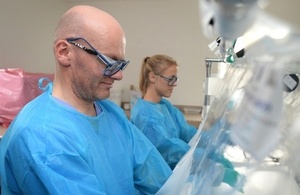New British Ebola labs to help stop spread of virus
Three new British Ebola laboratories will speed up diagnosis times across Ebola-struck Sierra Leone

The first of the British labs opened at Kerry Town, Sierra Leone last week (credit Staff Sergeant Tom Robinson RLC)
Britain is building and staffing three new laboratories in Ebola-struck Sierra Leone which will speed up the time taken to diagnose the disease and help to stop its spread across the country.
The Department for International Development (DFID) has pledged £20 million in new funding for the labs, where blood samples and swabs from all over the country will be tested for the deadly virus.
The first of the labs opened beside the UK funded Ebola treatment centre at Kerry Town last week. This lab alone will double testing capacity in Sierra Leone, while all three labs are expected to quadruple the number of tests that can be carried out every day.
Testing, diagnosing and isolating Ebola carriers as quickly as possible is essential to containing the disease. Test results can currently take five or more days to come back. Once fully operational these labs will help to turn them around in as little as 24 hours.
International Development Secretary Justine Greening said:
Tackling Ebola at the source is key to beating it and stopping the spread. Some of Britain’s best and brightest scientists will be at the forefront of our UK-funded testing facilities ensuring that people with Ebola are isolated and then treated as soon as possible.
Over the next few days and weeks around 50 volunteers will arrive to form the lab technician team, joining from Public Health England, universities, the NHS and the Defence Science and Technology Laboratory. One of them is top Ebola scientist and ex-army doctor Tim Brooks, recently deployed to Sierra Leone.
Dr Brooks, head of PHE’s rare and imported pathogens lab, said:
British scientists will be working tirelessly to run tests as quickly as possible. These new labs will be crucial in helping us to separate the people who have Ebola from those who have malaria or other treatable diseases, only made possible through the £20 million in funding.
In addition to building, staffing and running the new labs, the UK is working with the WHO, Sierra Leone’s Government and other partners to create a quicker and more responsive laboratory network. This will include providing fuel to transport samples and a better data management to ensure results are reported and returned as quickly as possible.
These labs will also give the all clear on Ebola to patients who survive the disease.
Two more are being built at the UK treatment centres in Port Loko and Makeni under the direction of UK Royal Engineers, Public Health England and the Department for International Development (DFID).
Notes to editors
- This new funding takes the UK’s commitment to defeat Ebola to £225 million.
- This includes support for 700 Ebola treatment beds which will provide direct medical care up to 8,800 patients over six months; funding for burial teams to increase capacity and work with communities on new burial practices; the roll out of up to 200 new community care centres. It will also shore up the country’s stretched public health services to help contain the disease. This includes vital supplies such as chlorine and protective clothing for thousands of health workers.
- Around 800 Ministry of Defence personnel will be deployed to help with the establishment of Ebola Treatment Centres and an Ebola Training Academy.
General media queries (24 hours)
Email mediateam@dfid.gov.uk
Telephone 020 7023 0600
If you have an urgent media query, please email the DFID Media Team on mediateam@dfid.gov.uk in the first instance and we will respond as soon as possible.